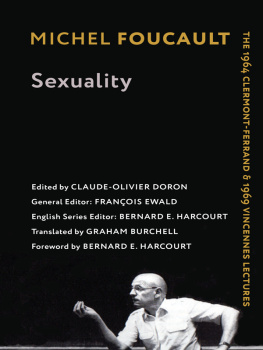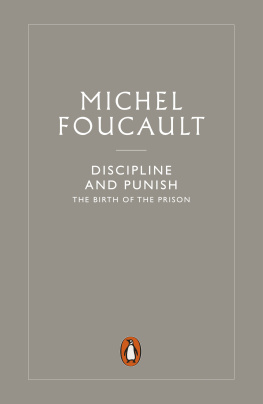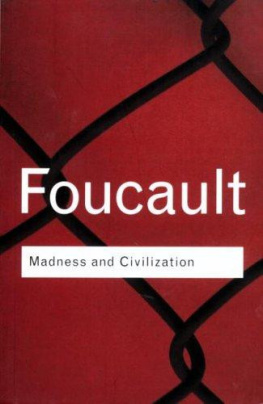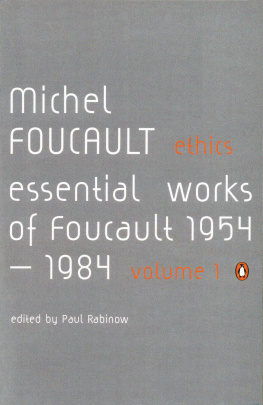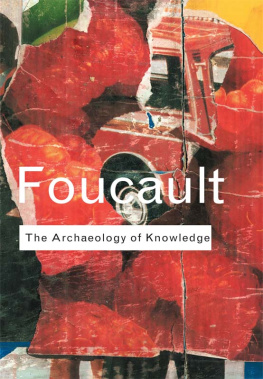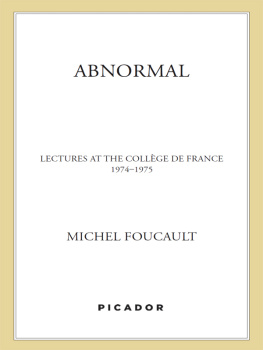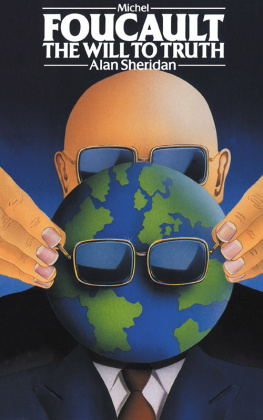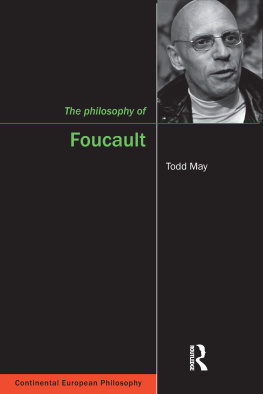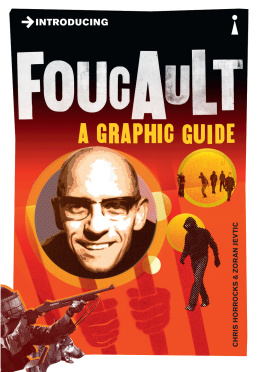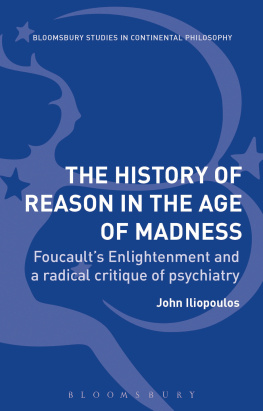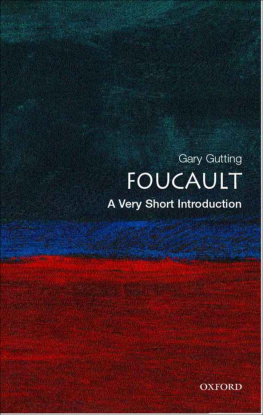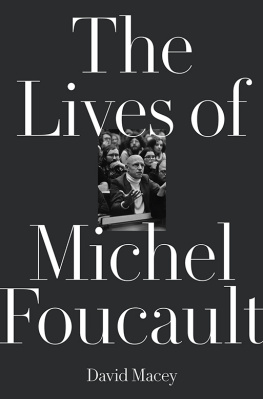History of Madness
Praise for this new edition:
One of the major works of the twentieth century is finally available in English. This comprehensive translation finally overcomes one of the great divisions within the world of reason; an occasion to revisit Madness and Civilization as it was written. Paul Rabinow, University of California, Berkeley
With this beautiful and moving book, Michel Foucault transformed our understanding of the processes that had made psychiatry possible the process which had brought its object, mental illness, into existence, and which inscribed it into our modern imagination as pathology, negativity, incompetence and deficiency. In studying the history of madness in this way, Foucault also taught us crucial lessons about the assembling of what we have come to call civilization. Now, at last, English speaking readers can have access to the depth of scholarship that underpinned Foucaults analysis: I have no doubt that this long awaited translation will have a transformative effect on a new generation of readers. Nikolas Rose, London School of Economics
Reviews of the original French edition:
A thick manuscript arrived: a philosophy thesis on the relations between madness and unreason in the classical age, by an author I did not know. I was dazzled when I read it. Philippe Aris
'This magnificent book... reuires a mind that is capable of being in turn a historian, a philosopher, a psychologist, and a sociologist... never simply one of these... This is not a method that could be offered as an example; it is not within the reach of just anybody. Something more than talent is necessary. Fernand Braudel, Annales
Michel Foucault
History of Madness
Edited by Jean Khalfa
Translated by Jonathan Murphy and Jean Khalfa
First published 2006
by Routledge
2 Park Square, Milton Park, Abingdon, Oxon, OX14 4RN
Routledge is an imprint of the Taylor & Francis Group, an informa business
First published in French as 'Folie et Draison: Histoire de la folie l'ge classique' Librarie Plon, Paris, 1961.
This edition is a translation of 'Histoire de la Folie l'ge classique' Editions GALLIMARD, Paris, 1972
Appendices 'Mon crops, ce papier, ce feu' and 'La folie, l'absence d'uvre' Editions GALLIMARD, Paris, 1972
Appendix 'Reply to Derrida' from Michel Foucault, Dits et Ecrits Vol II Editions GALLIMARD, Paris, 1994
This English Translation 2006 Routledge
Introduction and Editorial Matter 2006 Jean Khalfa
Foreword 2006 Ian Hacking
Ouvrage publi avec le concours du Ministre franais charg de la culture Centre National du Livre
This edition is published with the help of the French Ministry of Culture National Book Centre
Typeset in Joanna by RefineCatch Limited, Bungay, Suffolk Printed and bound in Great Britain by MPG Books Ltd, Bodmin
All rights reserved. No part of this book may be reprinted or reproduced or utilised in any form or by any electronic, mechanical, or other means, now known or hereafter invented, including photocopying and recording, or in any information storage or retrieval system, without permission in writing from the publishers.
British Library Cataloguing in Publication Data
A catalogue record for this book is available from the British Library
ISBN 10: 0415277019
ISBN 10: 0203642600 (eBook)
ISBN 13: 9780415277013
ISBN 13: 9780203642603 (eBook)
Biography of Michel Foucault
Michel Foucault was born in Poitiers on 15 June 1926, the son of a doctor. He finished his secondary education in Paris at the Lyce Henry IV in 1946 and went on to study philosophy at the prestigious cole Normale Suprieure, attending in particular the lectures of Maurice Merleau-Ponty and working with Jean Hyppolite, on Hegel, and with Louis Althusser. Despite suffering from sporadic bouts of depression and a suicide attempt in 1948, Foucault secured degrees in philosophy in 1948 and in psychology in 1950. He passed his agrgation in philosophy in 1951. He joined the French Communist Party in 1950 and quit in 1952.
Lecturing at the cole Normale Suprieure and working as a psychologist at the Hpital Sainte-Anne, in the early 1950s, he became dissatisfied with the confines of French academic life and held diplomatic and academic posts in Sweden (where he met and worked with Georges Dumzil), Poland and Germany, whilst working on his thesis Folie et Draison: Histoire de la folie lge classique . Initially rejected by Gallimard, it was published in 1961 by the great historian Philippe Aris at Librairie Plon, the publisher of Claude Lvi-Strauss. It was hailed as magnificent by Fernand Braudel. Several other now famous works followed, including The Birth of the Clinic, The Order of Things , and The Archaeology of Knowledge . In 1968, Foucault was appointed to a chair at the new, experimental, University of Vincennes and, in 1970, was elected to a prestigious chair at the Collge de France where he taught the History of Systems of Thought.
While producing a very large and influential body of research during the 1960s and 1970s, Foucault threw himself into political and social activism. He campaigned in particular on behalf of homosexuals and for prison reform. In 1975 he published one of his most famous works, Discipline and Punish: Birth of the Prison . Foucault travelled to North America in the late 1970s and early 1980s, teaching annually at the University of California at Berkeley. Freely experimenting with LSD and the liberal sexual environment, he lived what he termed limit experiences. During that period, in addition to many articles (published posthumously in four volumes), he wrote the three volumes of his History of Sexuality .
Fatally ill with AIDS, Michel Foucault died in Paris on 25 June 1984 in the Salptrire Hospital at the age of fifty-seven. After his death, the French prime minister issued a tribute and memorial homages featured on the front pages of all the national press. In his obituary, Georges Dumzil wrote, Foucaults intelligence literally knew no limits.
Contents
Ian Hacking
Thank goodness this enormous book is finally available in English. A masterpiece needs no foreword, so I shall hardly go beyond the title. The original one is a bit like Alices Cheshire Cat, of which nothing is left but the grin. It starts out as Madness and Unreason: History of Madness in the Classical Age , and fades away so that we are left with our present History of Madness . I shall go through the steps. It is a gradual disappearing act, and I shall point you in the direction of the disappeared unreason, not to explain it, but to encourage you to notice it. In the tale of the titles and of unreason, there are all the signs of Foucault changing his mind about madness.
The exact title in 1961 was Folie et Draison. Histoire de la folie lge classique . Very often only the first word of a French title is capitalised. In 1961 the second noun, draison , was also given a capital letter. Daniel Defert, Foucaults longtime intellectual colleague, companion, and posthumous editor, laid emphasis on the exact title of the original. He does so in his incredibly valuable date list, far richer than any ordinary chronology, at the beginning of Dits et crits , the collection of Foucaults published essays, interviews, speeches and prefaces.


